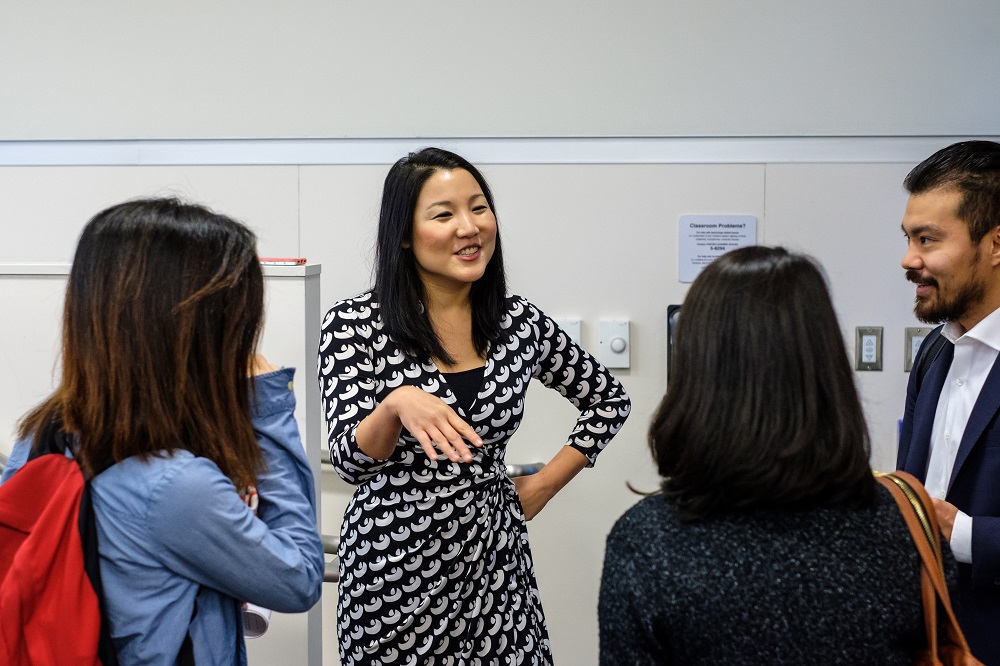Crystal Farh named one of Poets & Quants “Best 40-Under-40 Business School Professors”
 Crystal Farh, an associate professor of management at the University of Washington Foster School of Business, has been named one of the world’s “Best 40-Under-40 Business School Professors” by the influential b-school news site Poets & Quants.
Crystal Farh, an associate professor of management at the University of Washington Foster School of Business, has been named one of the world’s “Best 40-Under-40 Business School Professors” by the influential b-school news site Poets & Quants.
Farh has made a big impression since joining Foster’s Department of Management and Organization in 2015.
She has earned numerous awards for both teaching and research, and demonstrated a deft ability to bridge the two disciplines in her classes, which currently include Leading Teams and Organizations in the Full-time MBA Program and Managerial Effectiveness in the Executive MBA Program.
Students and colleagues alike waxed euphoric about Farh in P&Q, describing her in terms like “engaging,” “relatable,” “relevant,” “intelligent” and “prepared.” They celebrated her “energy,” “optimism,” “passion” and “joy.”
“Crystal is a genius,” said a fellow faculty member. “She has won every major award and earned extremely high student evaluations even in courses that are challenging to teach. She develops phenomenal teaching materials and shares them with others… She is also an elite researcher, having already published 11 articles in top-tier management journals despite earning her PhD less than a decade ago. She is my role model for what it means to be an ideal business school professor.”
Teaching relevance
Farh’s illustrious academic career and dynamic teaching can be traced back to a 7th grade classroom in an under-resourced public school in Oakland, CA, where she taught math and science for two years as a Teach for America corps member.
“I learned a lot about my own strengths and limitations and was also confronted with some of society’s greatest inequities,” Farh told Poets & Quants. “It was in this ‘crucible’ that I gained important insights about teaching.”
Lesson one: make it relevant.
“My 7th graders were extremely bright,” she continued. “But if I could not engage them with a tangible experience, if I could not demonstrate how the lesson connected to something they cared about, if I, for one moment, lectured for the sake of hearing myself speak, they would check out and start throwing paper wads (or worse) at each other.
“As it turns out, when it comes to effective teaching, some things do transfer, regardless of whether the audience is 7th graders or executive MBAs. What I learned in those two years, through trial by fire, I bring with me into the classroom every day.”
The result? Foster MBAs selected Farh as the recipient of the 2019 PACCAR Award for Excellence in Teaching, the school’s highest teaching honor.
Finding voice
Though the Poets & Quants index the most promising young professors is mostly about teaching, the site also noted that Farh is one of the most prolific researchers on this year’s list. In addition to her strong record of publishing papers in the most influential management journals, she has notched more than 2,800 Google Scholar citations to date and received mention in media outlets ranging from Forbes to HuffPost to New York Magazine.
Her work has earned the Wallace Dissertation Research Award from the Society for Industrial Organizational Psychology, an Emerald Citation of Excellence and an Office of Naval Research grant. The Western Academy of Management named her an Ascendant Scholar in 2017.
 All of these accolades derive not only from the quantity and quality of Farh’s scholarship, but also its relevance.
All of these accolades derive not only from the quantity and quality of Farh’s scholarship, but also its relevance.
Her research delves deep into topics of leadership, teamwork and, especially, employee voice and creativity. For instance, her 2020 paper in the Academy of Management Journal finds that enacting a “token” woman’s ideas helps traditionally all-male teams solve complex problems more effectively.
Useful insights for tomorrow’s leaders to begin exercising today.
Listen and learn
In her P&Q portrait, Farh shared her favorite hobbies (hiking, exploring restaurants, “family-watching”), summer plans (“Learning R to keep up with my PhD students”), favorite book (Edge: Turning Adversity into Advantage by her friend, Laura Huang), songs (“The Champion” by Carrie Underwood featuring Ludacris, and “Brave” by Sara Bareilles), and movies (Miracle, Remember the Titans, Hidden Figures).
She also revealed that she would have aspired to a career in music—Broadway star, church choir director, wedding singer—if this whole business professor thing hadn’t worked out. (Her passion for song dates back to the 4th grade, when she was cast as Maria von Trapp in her elementary school’s performance of “The Sound of Music.”)
But most of the piece focuses on her academic work, and the seamless way in which she infuses her own research insights on teamwork, creativity and voice into the hearts and minds of her highly engaged students and the world at large.
Asked to envision the business school of the future, Farh replied:
“This year, more than ever, we have seen the need for business schools to be at the forefront in developing leaders who are able to listen to the voices that are not their own. Our gut instinct is to reject or dismiss perspectives and experiences that feel unfamiliar to us. We tend to seek out and amplify the voices that already surround us, instead of reaching out to invite others to join the conversation.
“Listening is what enables leaders to bring people together to tackle the grand challenges of today. When we listen, we see the humanity in ourselves and others. When we listen, we gain the fuel and insight to get where we need to go, together.”
Read the full story at Poets & Quants.
